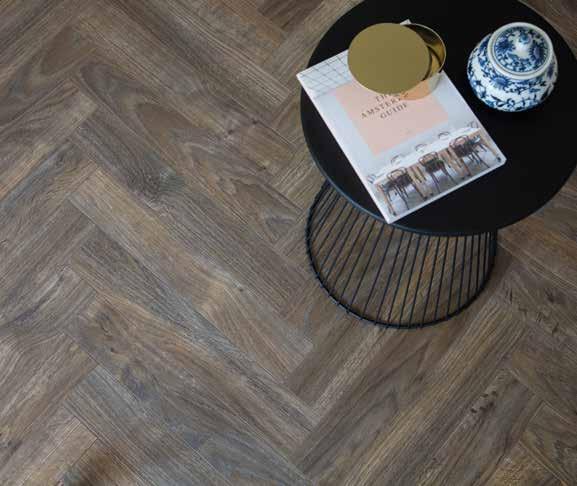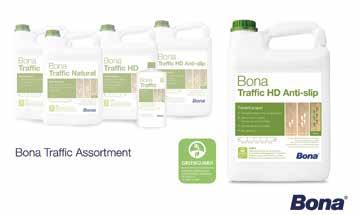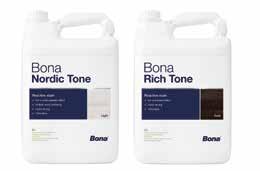
4 minute read
Special The range of tools and sandpaper or nets for satellite sanding machines
DARE TO EXPLORE THE MARKET
ALL SORTS OF NEW APPLICATIONS ARE EMERGING FOR AN EVEN BETTER SURFACE FINISH
Advertisement
If you want an ideal end result for a wooden floor, sanding is almost always absolutely essential. Sanding also immediately means the use of abrasives on the diverse types of sanding machines. Obviously, we all think here first of ordinary sandpaper, but there’s more. Abrasive nets certainly have particular features which can be beneficial for professional users.
How exactly do you choose the right sandpaper or abrasive net for a sanding machine? There are choices in abundance on the market, so we prefer to keep things somewhat more general and consider the ‘basic questions’ to be asked before you sand a floor.
Rough, less rough, fine, finest
Obviously, the first thing to consider is what sort of sandpaper to use. Rough sandpaper is used mainly for rougher work, whilst ultra-fine sandpaper is the ideal tool for use after a coat of lacquer has been applied. Nevertheless, this wisdom isn’t the end of the matter, and never forget that the exception to the rule can also be a rule!
We know that there is a choice of grain sizes, which ranges from 16 to 150. Manufacturers offer diverse standard grain sequences (e.g. from 16 to 24 or from 100 to 120). The most important point is that to achieve an ideal end result it’s best never to skip more than one of the prescribed grain sizes. It’s also best with both edges and large surfaces to use the same abrasives to prevent differences in colour.
If you use a sanding machine, remember always to start with a somewhat rougher grain and to sand the floor in several sessions, making the grain somewhat finer each time. Always remember, too, that not only do you have to clean the floor first, but also a sanding test at the start isn’t a luxury.
Abrasive nets
With the so called ‘new sanding’, you can work even more precisely (so that, amongst other things, there are no scratches) and it is here that abrasive nets come into play. As the name suggests, abrasive nets have a net as a carrier.
We surveyed the market and came out at Sia Abrasives, which we’re using as an example to clarify abrasive nets. This producer supplies net-carrier grains which make it possible to remove dust from the entire surface thanks to an open support structure. The big advantage is that this removal of dust ensures a fairly dust-free work environment. And so, that is better for the health of the user, a more reliable sanding process, and a longer lifespan for the abrasive.
It is interesting to know that they offer two sorts of sets: grains on linen/paper-carrier material and grains on net-carrier material. With the linen or paper carrier material, the sanding grain is embedded over the entire surface in a binding agent and the dust escapes via counter-punched holes. Indeed, the bound grains hardly allow any space for the accumulation of dust, and that also has a big effect on the effective working life of the abrasive.
With the use of a net carrier material we note at this manufacturer that it consists of polyester fibre which is sprinkled using a modern specific production method. Thanks to a refined process, only the top fibre is equipped with the net of grains (ceramic aluminium oxide). The internal, functional structure and the rear side of the abrasive with its own Velcro fastening thereby stays free of abrasive grains. If we look specifically at the result with the powerful Sianet 7500 CER, you can say that sanding with these sanding discs makes it possible to sand even finer (end grain 180 instead of 100 for oil and coloured oil), and that yields less visible scratches.
A specialist
Lägler
“The range of tools and sandpaper or nets for satellite sanding machines”
A wide range of different abrasives is offered for single disc sanding machines. The benefit-cost ratio should always be taken into account! Lägler offers an optimized, comprehensive range of abrasives and accessories for its SINGLE - to cover a wide range of requirements. Sanding rings and discs are available in both zirconium and silicon carbide. Depending on the design, they can be either simply and quickly velcroed or fastened with a tensioning screw. Sanding screens of silicon carbide are used for fine sanding and intermediate varnish sanding. In addition, Lägler has a large selection of pads for a wide range of applications in its program. The range of tools for the SINGLE is extensive. Four different tool variants for subfloor processing, from milling to sanding, are currently available. Quickly mountable tools for which just one stainless steel base plate is required!










